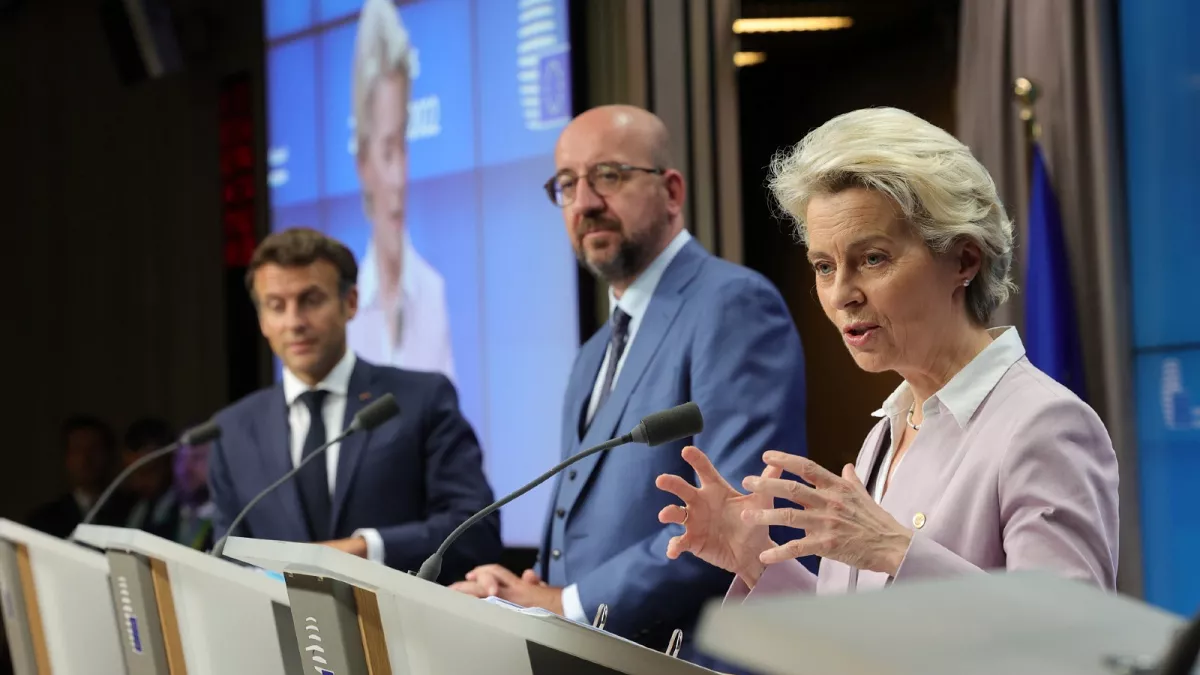EU leaders divided over how to finance weapon

Since Russia invaded Ukraine, ramping up EU defence industry production has been on the agenda of member states’ leaders, but it is only slowly beginning to gain traction, informs Euroactiv.
The most sensitive issue is the future financing of more defence investments.
EU leaders agreed on Thursday (21 March) to push the European Investment Bank (EIB) to “adapt its policy for lending to the defence industry and its current definition of dual-use goods while safeguarding its financing capacity”.
They also moved closer to using proceeds from frozen Russian assets to help Ukraine within a few months as part of a plan that would earmark the majority of the money to buy arms for Kyiv.
The European Commission had proposed allocating 90% of the requisitioned proceeds from the frozen Russian assets to fund Ukraine’s defence production and military aid, with the other 10% going to budget aid for Kyiv.
European Council President Charles Michel and European Commission President von der Leyen said the idea of using the proceeds of frozen Russian assets to benefit Ukraine—which Moscow says would be theft—has broad support among EU countries.
However, using the money to buy weapons is problematic for some, including neutral militarily non-aligned countries such as Austria, Ireland, and Malta.
“For us neutrals, it must be ensured that money, for which we give our approval, is not spent on weapons and ammunition,” Austria’s Chancellor Karl Nehammer said.
Michel said the bloc could find ways to take into account their concerns.
“Russia must feel the real cost of war and the need for a just peace,” Ukraine’s President Volodymyr Zelenskyy said, urging EU leaders to go even further and use the assets themselves, a step that the bloc is not considering so far.
But despite the urgency, they disagreed on an overall wider push for European financing of weapons for Kyiv, such as Eurobonds for defence, called for by Estonia and France.
Frugal member states, such as the Netherlands and Sweden, remain sceptical towards joint borrowing on the finance market for defence purposes.
“The urgency of the matter means we have to consider options we don’t love,” one EU diplomat told Euractiv.
Leaders asked the Commission to “explore all options for mobilising funding and report back by June” in language pushed by the Baltics, Poland and Greece.
“The debate is at the beginning and not at its end,” von der Leyen told reporters.
‘Power grab’ fears
Even without a coherent plan on financing the new shift, the Commission in a short time has laid out plans for a European strategy on defence.
This includes von der Leyen’s idea of a new defence (industry) commissioner for the next term, more dedicated defence funding, expanding the bloc’s defence industrial base and using Russia’s frozen assets.
They even go as far as the EU’s executive being ready to place arms orders for member states in a boost to joint arms procurement.
But von der Leyen’s plan for a European defence industrial strategy is getting pushback from several EU countries, including Germany, which supports boosting the sector but fears the plan includes a power grab of national competencies.
In Thursday’s summit discussions, EU diplomats said there was considerate scepticism.
Germany’s Chancellor Scholz told EU leaders the bloc would not need “another state-like structure for defence in the EU” or create new competencies that would amount to a power grab, according to two people with knowledge of the talks.
While he stressed the need to develop the bloc’s potential regarding joint procurement, he rejected the idea of having the Commission as an intermediary, which could slow processes down, they said.
“She wants to be a war-time president but forgets that the EU is not a state,” one EU diplomat said, echoing those who criticise her for using defence to help her get a second term in office.
Contentious EDIP
Over the past months, several EU countries have expressed concerns over the Commission’s intentions behind the European Defence Investment Programme (EDIP), the EU executive’s ambitious framework to boost the bloc’s military-industrial complex.
Several innovative measures are considered sensitive, as they would give EU member states and the Commission the power to reorientate industries’ priorities, fund weapons production, and give the EU body an overview of manufacturing capacities and supply chains usually protected by governments for national security reasons.
When presenting the text, Internal Market Commissioner Thierry Breton said that his house would not be interested in a “power grab” and denied any loose interpretation of the EU treaties, which forbid channelling EU funds to military operations.
To avoid the accusation, the European Commission based its proposal for an industrial policy – like with previous defence industry schemes – on Article 173 of the EU treaty, giving ways to work on the bloc’s industry competitiveness.
The Commission’s directorate general in charge of implementing the programme—DG DEFIS—has recently sent envoys to prepare the groundwork with EU countries to diffuse any potential issues.
Despite the concerns, EU leaders on Thursday tasked national ministers with looking into the EDIP text “without any delay”.
Negotiations on the technical details are set to start in early April, with the Council to set its position in June before the new European Parliament comes into session over the summer.